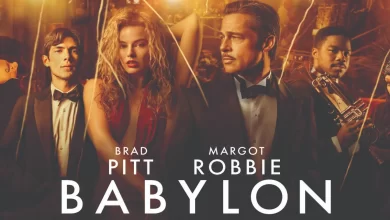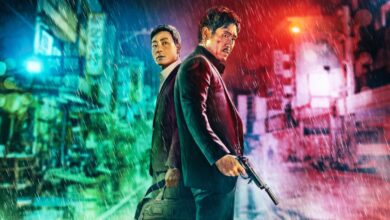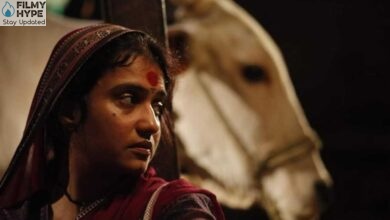Doctor Strange In The Multiverse Of Madness Review: Packaging The Most Courageous And Anarchic Film In The Marvel Cinematic Universe
Stars: Benedict Cumberbatch, Elizabeth Olsen, Chiwetel Ejiofor
Director: Sam Raimi
Where To Watch: Theaters
Filmyhype.com Ratings: 4/5 (four star)
We say it immediately, without mincing words and without frills: long life to Sam Raimi. Because Doctor Strange in the Multiverse of Madness, more than a great superhero blockbuster, even before it can be defined as a Kevin Feige production or another intriguing piece of the gigantic Marvel Cinematic Universe, is above all a splendid cinecomic by Sam Raimi. A film entirely by him, adhering in every fiber to the Raiminian cinema: anarchic, disconcerting, powerful. In a word, as fully fitting his intricate Multiverse, insane.
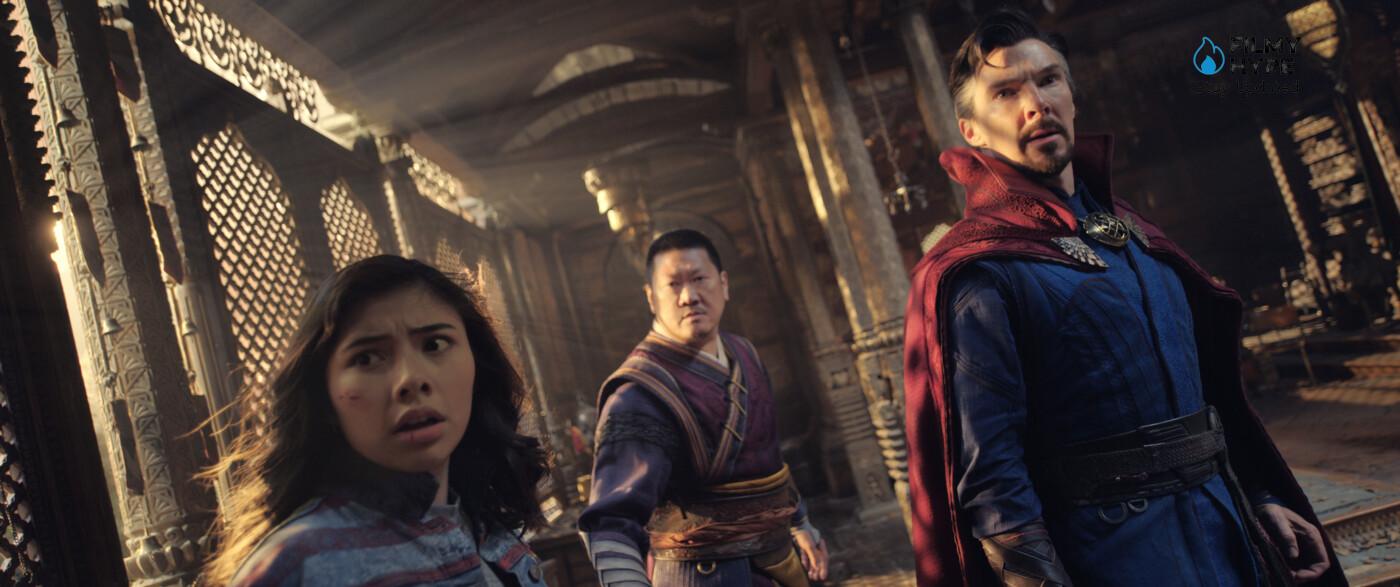
I write this review in the heat of the moment, a few minutes from the end of the credits and two things are certain: Sam Raimi is a director who moves on levels precluded to many colleagues, perfect for amplifying to the maximum what is perhaps the greatest value of Marvel: the ability to generate enthusiasm, to galvanize his audience while he is there, sitting on the cinema seat. With a cold mind, the film is likely to show its weaknesses, both at the plot level and in the vast Marvel universe, increasingly difficult to keep together, aggregate. If the joy of finding a Sam Raimi in excellent shape is immense, over time perhaps the bitterness will emerge to add him to the list of how many Marvel does not use to their full potential, but rather to “cover” his most recent weaknesses.
Doctor Strange In The Multiverse Of Madness Review: The Story
On the other hand, without frills is also the narration that Doctor Strange in the Multiverse of Madness puts us in front of That of a powerful and calculating entity, but also imperfect and fallible, which in the prologue of Multiverse of Madness must come to terms with many of its recent actions and with certain ghosts from its past. From his role as an inglorious demiurge in the war against Thanos to his latest actions alongside Spider-Man (by the way, swing in the direction of our Spider-Man No Way Home review), not forgetting the personal torments that have been going on since the first film. Scott Derrickson grip Stephen’s heart: the suffered and now forbidden love for Christine, on the other hand, is at the center of the beautiful episode dedicated to Strange in What If (our review of What If is only one portal away from you), to which certain stylistic choices of Multiverse of Madnesse are understandably indebted.
The narrative trappings inherited from the previous iterations of the Doctor in the shared universe, in short, were largely predictable and fairly expected. In addition to that of the aforementioned Chavez, the role of Elizabeth Olsen’s Scarlet Witch , as well as that of the Illuminati, and obviously the implications of this mysterious Multiverse of Madness remained to be clarified: a concept of which, to quote the words of Strange himself in No Way Home, “we know terribly little” and above all certain dynamics were not entirely clear sent, straight to the point, immediately in the heart of events (but above all of the Multiverse itself) since its very first sequences. An incipit that immediately clarifies the role of America Chavez, but also of a specific variant of Stephen, and in general of the evolutionary path that the new MCU film wants to put in front of its protagonist.
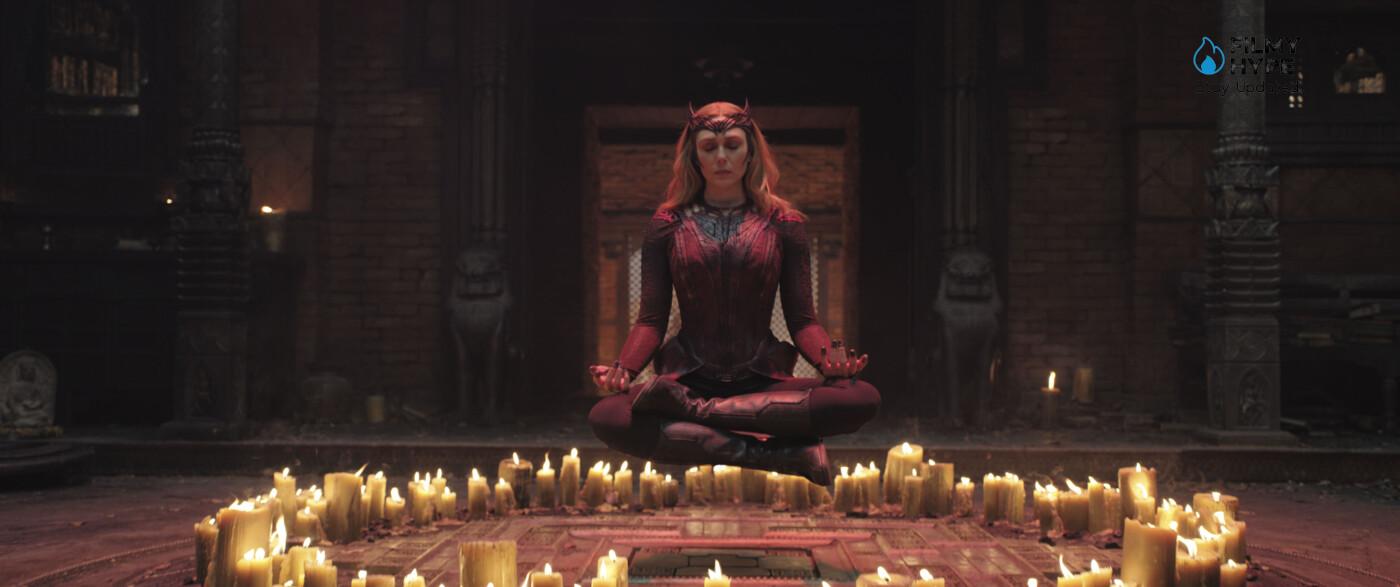
Without climbing into awkward spoilers, we can tell you that he expected concrete answers on the future direction of the Marvel Cinematic Universe and on the use of the Multiverse may remain slightly dissatisfied. The truth is that Sam Raimi’s film, not being particularly diluted in the minutes, chooses a different and more independent path: the impression is that the Multiverse of Madness is in any case conceived to represent the first brick of a larger mosaic, but that the extravagant nature of the project represented more than fertile ground for exploiting the authorship and creative genius of its director.
To the point that, probably, the main flaw of this Doctor Strange 2 lies precisely in the use it makes of the Multiverse and the story itself: we are faced with an extremely dense film, perhaps even too much, which (fortunately) does not compromise the coherence of the story, but speeds it up without all the characters having the right breath. And it is precisely the case of Wanda Maximoff, to whom Elizabeth Olsen gives a performance as intense as that of WandaVision (recover our review of WandaVision). Scarlet Witch is surprisingly central to the plot, exploited very well thanks to its charisma, but not very thorough and inexplicably regressed with respect to its beautiful evolutionary path during the Westview events, and is probably the reflection of a story that would have needed a more concrete writing, however net of a choral management of various characters (and extras: all dosed, measured, coherent and exciting to the right point) that remains convincing.
Doctor Strange In The Multiverse Of Madness Review And Analysis
However, it is in the form, in the visual packaging and in the exercise of style that Doctor Strange in the Multiverse of Madness confirms not only something never seen before, but even one of the best Marvel Studios productions ever. Never as before, in fact, the commercial need of Kevin Feige fits perfectly with the creative freedom granted to Sam Raimi, who exploits the madness of the Multiverse to perfectly contaminate his style with the narrative formula of the MCU.
Doctor Strange 2 is an anarchic, visionary and at times even courageous film. Because mature, violent, in some moments even splatter and surprisingly dark. He is Sam Raimi at maximum power in a mainstream work, a cinecomic in which the family rules imposed by Kevin Feige and the sick recklessness of the director of La Casa coexist peacefully. A marriage that not only turned out to be happy, but even balanced in his compromises. Because Raimi’s vision and his horror approach to him, in certain segments of the film, end up overlapping with the trappings of consumer films, always remaining elegant, fascinating and pop. And it is difficult to further analyze the Multiverse of Madness without necessarily going into the detail of the individual scenes, the characters used, the choice of shots and the impeccability of certain camera movements, as well as some specific stylistic and musical choices.
All that matters to tell is that, as hasn’t happened for years, the identity of an author emerges in the visual framework of a great Marvel blockbuster.to the point of overshadowing its narrative defects, which in any case will be properly analyzed in a long “full spoiler” reflection. An overwhelming visual magnificence, which combines the power and restlessness of the images with brilliant directorial ideas supported by the sumptuous musical gigantism of Danny Elfman. A memorable experience to say the least, which brings the creative and anarchic genius of Sam Raimi back to the Olympus of the great superhero blockbusters.
The story that Marvel tells us should turn it to itself. The number of tasks that Doctor Strange has to perform before he can tell his story is impressive and he ends up invalidating (in some places in an important way) his success. In a way it is a standalone film, which tells an adventure of Steven Strange. Conventionally enough, the film delves into his ambiguous relationship with magical power, his arrogance, his regrets about what didn’t happen with his beloved Christine (Rachel McAdams) and his reluctance to take on the role of leader, preferring that of mentor and pupil.
We know that Cumberbatch is a thoroughbred actor who has ventured into unfamiliar territory over the past year, taking risks. After The Power of the Dog, here too he takes a chance, proving to be reassuring for the family audience, to have a certain comic and slapstick streak and – just like his character – to have learned to give the scene when necessary.
In fact, for a good part of the film the center stage goes to Elizabeth Olsen in the role of Wanda Maximoff who – in her own words – is committed to getting out of the mournful tunnel faced in WandaVision. She does it in her own way, with a powerful role in every sense, which recalls other characters from other genres, but which has too much space available for the little material available. Olsen and Cumberbatch share a film with only two great characters who would need more space and both are somehow not fully exploited.
What used to be a doubt is becoming a certainty. To stem the consumption of the scheme it has been using (exploiting?) For years, Marvel is trying to engulf all the other available genres in its films. In Moon Knight we saw an attempt at a psychological thriller, here there is clearly a very strong horror imprint. The idea of recalling Sam Raimi, who practically invented this kind of raid with his Spider-Man trilogy, is both banal and ingenious. Raimi has not lost his touch and indeed: in the second part of the film, when the film has lost all the interesting things to say, he is rampant.
Credit to Marvel who left him enough free rein to create a series of sensational minifilms within the film, with a slew of homages to the horror genre of yesteryear, especially the 80s (there is a lot of air of those same products on which Stranger Things has drawn heavily) and even from films that are not too refined but particularly effective at low budget. If we want to be cynical – and perhaps with a cold mind we will need it – this horror work is in turn yet another quote, yet another tribute, multiplied by size and shape, to that Spider-Man 2 who has reached heights that this film would have all the means to replicate, but Marvel is obsessed with the control of his creature, which continually risks getting out of hand. There is cowardice but also courage, mixed in a stunning mix of fun and surprise, but which is perhaps a gamble in terms of flavors.
Raimi risks scenes and suggests horror implications that very little bypass the limit that would require a higher rating of the film, keeping the audience of families in the room but giving them a good shake (and often nudging those in the room who understand what we are talking about really, both in comics and horror). As an entertainment film Doctor Strange in the Multiverse of Madness does everything necessary and more to deliver high-voltage entertainment to those who demand a galvanizing, nerdy, escapist experience in Marvel movies. It sounds like a dream, but when you wake up it could turn into something far more unpleasant.
It is a crime, however, to continue to underuse talents of this level for hyperconscious, hyper calculated films of artificial spontaneity, which always want to keep the knife on the side of the handle. Under the quotationism and cameos he is sacrificing so much on the altar of cinema, arguing that in the calculation of the MCU a single film, a single opportunity can be sacrificed for the stability of everything else. Sometimes, however, it is necessary to work to save a single universe, a single film, sacrificing the bigger picture. It’s a shame Marvel didn’t find this title worthy of this treatment, but it remains a thrilling experience.
Doctor Strange In The Multiverse Of Madness Review: The Last Words
Doctor Strange in the Multiverse of Madness is the first film of the Marvel Cinematic Universe in which the creative anarchy of an author takes over the commercial formula, without ever extinguishing it completely and – rather – meeting it. It is Sam Raimi’s film in all respects, with overwhelming visual ideas and an impeccable direction, well distributed between a surprising horror patina and a spectacular aesthetic system. Unfortunately, the new epic of Doctor Strange pays for a lot of narrative material with a script that is so coherent but too dense, which would have needed more breathing space for the evolution of some characters. But nevertheless, Doctor Strange in the Multiverse of Madness is confirmed as one of the best productions of the Marvel Cinematic Universe.



